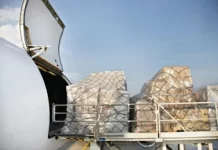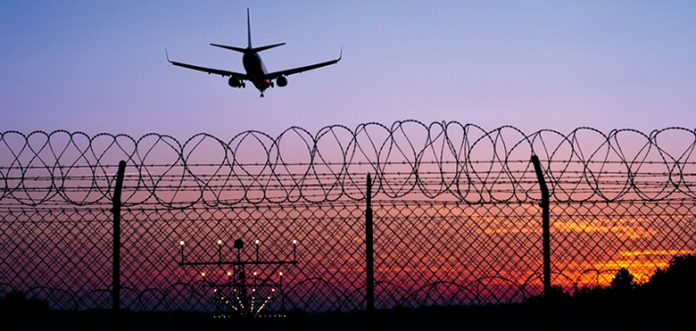In the early hours of last Friday, a passenger aboard a Port-Harcourt bound Azman Air flight posted on the social media a video showing a man, who from the bushes nearby the runway got on the wings on the plane and dumped his bag in one of the engines of the plane. As expected, the passengers panicked, prayerfully hoping the bag wasn’t a bomb.
This is just one of the numerous cases of perimeter intrusion in airports across the world. And as expected, this is not the first time the runway of an airport will be invaded in Nigeria.
In 2013, there was a reported case of a young boy jumping into one of the engines of a Lagos bound Arik Air flight at the Benin airport after surfacing from the bushes nearby. Before the flight, it was reported that the pilot of the flight informed the authorities, but he was cleared to fly.
Also, in 2018, supporters of Aliyu Wamakko, invaded the tarmac at the Sultan Abubakar Sadiq 111 Airport, Sokoto. A mini welcome entourage by the loyalists, on a runway?!!!
It is no doubt that perimeter security poses a significant challenge for any airport, no matter the size or its location. But one thing we can all agree on is that this menace can be curbed when the necessary measures are put in place.
Section 4.2 of ICAO Annex 17 states that establishing a security perimeter around the airport airside area and controlling access are basic requirements for airport security with respect to perimeter fencing.
At the GREPECAS Aviation Security Committee in 2006, under the directive of ICAO, contracting states were instructed to ensure that the integrity of the airport perimeter fence is maintained and regularly inspected for the entirety of the perimeter. Also, random and regular patrol should be scheduled to inspect the barrier with a particular focus on areas where breaches or attempted breach are more likely to occur. This according to the directive could be achieved with a 24/7 patrol across the entire length of the fencing.
The question then goes, with the porosity of Nigerian airports, how well has the authorities in charge come up with a lasting solution to these invasions?
Airport authorities should know that aside service provision to both airlines and passengers alike, security is of utmost importance. Irrespective of the size of the airport or location, putting into consideration the geography and topography, it should be all about ensuring a safe and secure avenue for people who fly daily.
One of the measures that can be adopted to ensure this menace is curbed is the use of electric fences with cameras and patrols in place for consistent monitoring.
Aviation security in Nigeria should be taken with utmost regard and reference. AVSEC officers are expected to be at alert at all times to be ready to wade off any unnecessary breach or wade in when the intruders manage to pass them by (which shouldn’t occur in the first place).
It is understandable that the cost of putting in place is a bit on the high side. For instance, following two perimeter breaches at Hartsfield-Jackson International Airport in Atlanta, Georgia (the move was in response to several security breaches in the summer of 2018 including a man who scaled a fence and ran onto an active taxiway and a trespasser walking on an access road inside the perimeter fence in the early morning), the airport began an installation of concertina wire on fencing around the airport perimeter. The wire fencing, installed at a rate of around 450 feet per day, cost approximately $5 million in total, and was paid for with airport funds.
The revenue generated by Nigerian airports on a yearly basis could be used to fund this project. In 2017, according to the former Managing Director of FAAN, Saleh Dunoma, the authority generated N38 billion from Passenger Service Charges (PSC) in 2017. Also, the former MD stated that the automated car park at the General Aviation Terminal of the Murtala Muhammed International Airport, Lagos increased FAAN revenue by 68 per cent in 2017 alone. All that needs to be done is for stakeholders and government to come around and develop a lasting solution. Nigeria is on a path of positioning its aviation industry in the fore front, we can as well start by getting some of these issues right.













